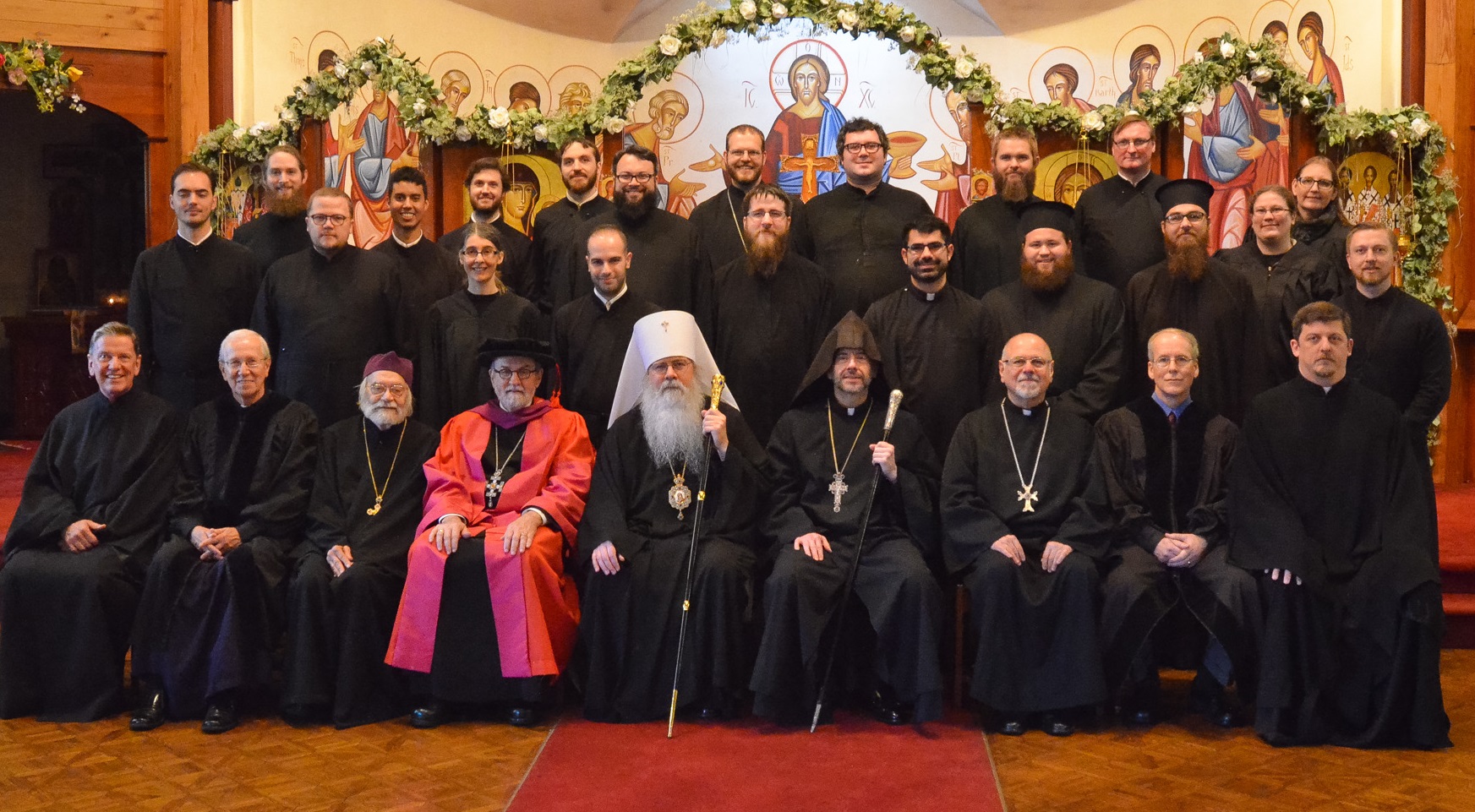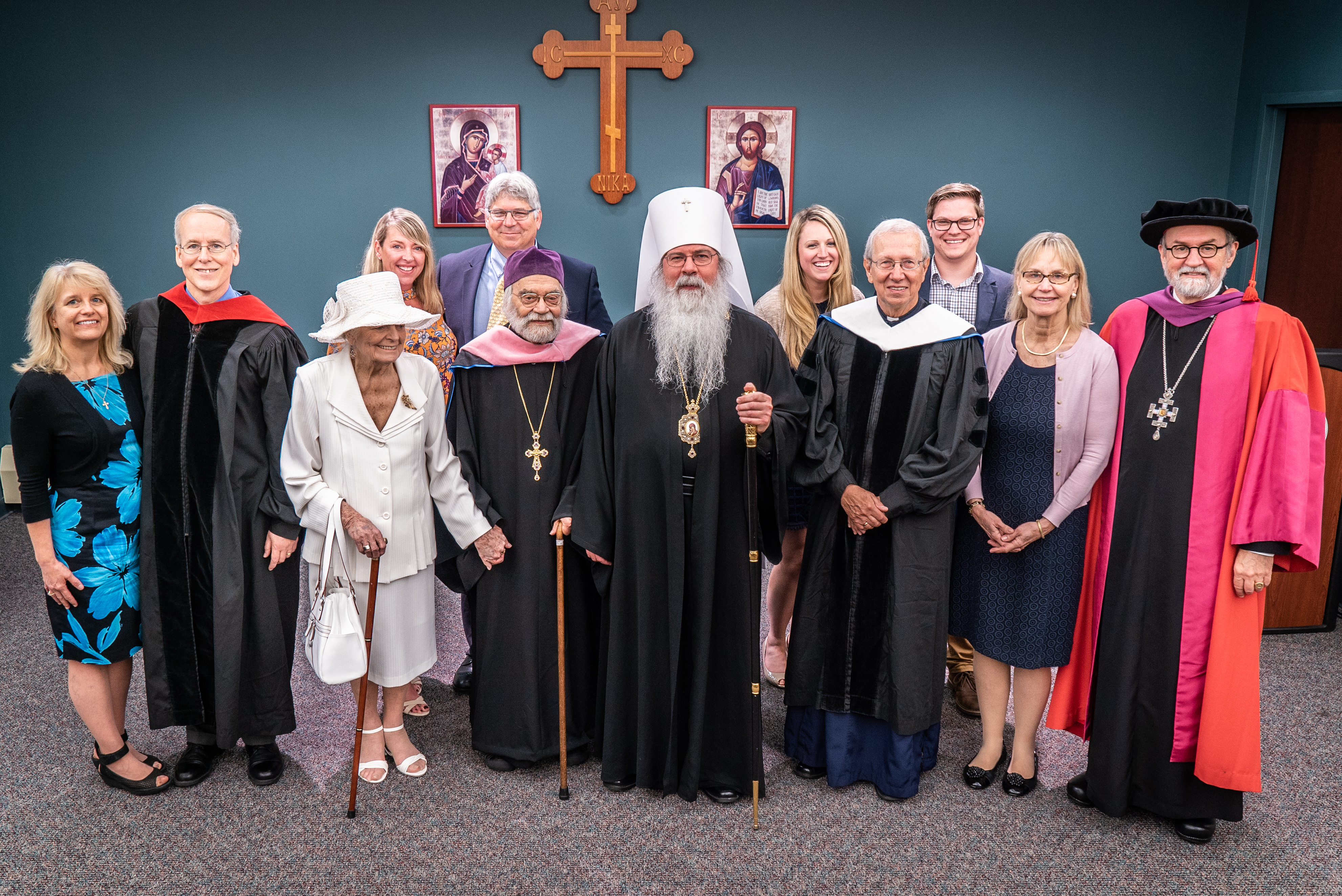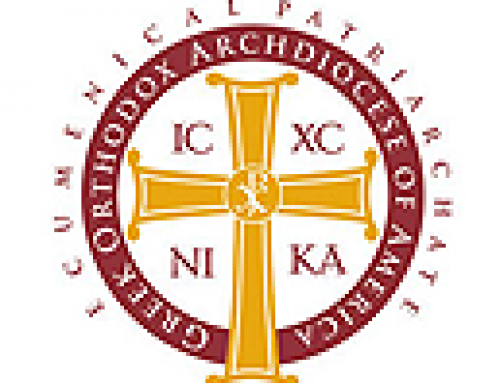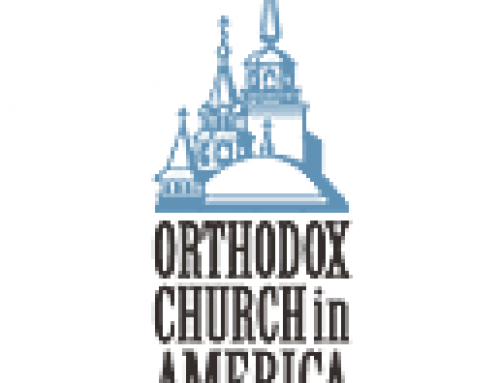This post was originally published on this site

At its commencement exercises on Saturday, May 19, 2018, Saint Vladimir’s Orthodox Theological Seminary [SVOTS] conferred degrees upon 20 graduates, including 13 Master of Divinity, five Master of Arts, and two Master of Theology students, and awarded three honorary doctorates.
The day opened with the celebration of the Hierarchical Divine Liturgy in the seminary’s Three Hierarchs Chapel on Saturday morning. His Beatitude, Metropolitan Tikhon presided. Concelebrating were clergy from among the faculty, student body, and Board of Trustees, including Archpriest Chad Hatfield, SVOTS President; Archpriest Alexander Rentel, Assistant Professor of Canon Law and Byzantine Studies; Archpriest John Jillions, SVOTS Board member and Chancellor of the Orthodox Church in America; and Archpriest David G. Barr, Chair of SVOTS Alumni Association Board.
During the Divine Liturgy, Metropolitan Tikhon delivered the homily, the text of which appears below.
On Saturday afternoon, Metropolitan Tikhon officially opened the commencement exercises in the Metropolitan Philip Auditorium after the celebration of a Service of Prayer. Father Chad Hatfield welcomed the graduates and guests and offered a look back at what he called “a remarkable academic year” at the seminary.
Among the distinguished guests were two representatives of Saint Nersess Armenian Seminary: Bishop-Elect and Alumnus Very Rev. Daniel Findikyan, who was recently elected Primate of the Eastern Diocese of the Armenian Church of America, and Priest Mardiros Chevian, Dean of Saint Nersess Seminary. Their presence was particularly meaningful as 2018 marks the 50th year of cooperation between Saint Vladimir’s and Saint Nersess Seminaries.
The Commencement Address was delivered by Dr. David Bradshaw, Chair of the Department of Philosophy at the University of Kentucky. He spoke to the graduating class on the need to share, in particular, three beautiful aspects of Orthodox Christianity still largely unknown or misunderstood in the secular world: Orthodox worship, the wisdom and example of saints and monasticism, and forgiveness. “If I have learned anything over the years that I have spent teaching, it is that our secular friends want and need this treasure,” he said.

Dr. Bradshaw was one of three individuals who received honorary doctorates during the commencement ceremony. Also receiving honored for their outstanding contributions to the Orthodox Church were Mitred Archpriest Sergei Glagolev and Seminary Trustee Emeritus Protodeacon Peter Danilchick.
Seminarian Timothy Aznavourian delivered the Salutatory Address, while Dimitrios Nikiforos delivered the Valedictory Address. Student Council President Angelo Niqula presented the Saint Macrina Award for Excellence in Teaching, selected each year by student vote, to SVOTS Director of Music Robin Freeman.
At the conclusion of the Commencement Exercises, His Beatitude Metropolitan Tikhon addressed the Class of 2018, sharing a moving story about a cheerful email he received from an 11-year-old girl in the midst of her struggle with cancer, from which she subsequently passed away.
The text of Metropolitan Tikhon’s remarks may be found below.
Homily of His Beatitude, Metropolitan Tikhon
Commencement Day Divine Liturgy at Saint Vladimir’s Seminary, Yonkers, NY
Saturday, May 19, 2018
In the Name of the Father, of the Son, and of the Holy Spirit.
We are now in the liturgical season between the feast of the Ascension of our Lord, God, and Savior Jesus Christ and the last and great feast of Holy Pentecost, the coming of the Holy Spirit. Our Lord speaks of this period in today’s Gospel reading when He says: “I will pray the Father, and He will give you another Helper, that He may abide with you forever – the Spirit of truth, Whom the world cannot receive, because it neither sees Him nor knows Him; but you know Him, for He dwells with you and will be in you.”
The ten days we find ourselves passing through, between the ascent of the Son of God and the descent of the Spirit of God, are an image of our life in the Church, which is a time of expectation and hope.
It is also a time of uncertainty and struggle, and all of these states perhaps characterize our days at seminary in particular. Whether you are graduating with the class of 2018 or continuing on with your studies here at Saint Vladimir’s Seminary, most of your days might perhaps be summarized by the scene from today’s Epistle reading, which finds the disciples coming together to break bread on the first day of the week.
Much like your competent and eloquent professors here, the Apostle Paul was speaking to his students and continued his message until midnight. We are also told that there many lamps in that upper room where they were gathered together. Three years of burning the midnight oil can take a toll and as students, you may even on occasion have felt like that young man sitting in the window, Eutychus by name, who, in spite of the inspired and zealous person who was speaking, was nevertheless sinking into a deep sleep.
And those of you who are graduating may even have been overcome by sleep and fallen from the third story and have been taken up dead. The seminary experience is indeed a grueling experience and one might in fact feel completely exhausted and lifeless by this point. But as the story in Acts continues to tell us, Paul went down, fell on him, and embracing him said, “Do not trouble yourselves, for his life is in him.”
“Do not trouble yourselves, for his life is in him.” This is a comforting word for the families of those who are graduating today.
I was with the graduating students on Thursday night, along with the entire Board of Trustees, and it was inspiring to see once again a collection of men and women from diverse backgrounds putting themselves forward to serve the Lord, even when there are uncertainties about what that will look like. All of us here in some way share in this vocation of desiring to serve the Lord.
Today’s readings from the Acts of the Apostles and the Gospel of John give us encouragement and challenge, whether we are beginning or continuing our service in the Lord.
This too is the same basic pastoral work to which you and I are called in our own spheres: visiting people and communities to see how they are doing, encouraging them, and strengthening them. Whether it is a pastor visiting people in a parish or a bishop visiting his priests and people or a metropolitan visiting patriarchs, the labor is much the same: building up the Church through personal bonds in Christ.
This brief account should serve as a reminder to us that we are all, within the holy Church, on what Saint Herman calls a “pilgrimage of the apostolic word,” and that at every moment of that pilgrimage, we need to measure ourselves against Christ and against those who have, through martyrdom, through asceticism and missionary labors, shown themselves to be witnesses to the glory of the Kingdom.
And from that measure, each of us at Saint Vladimir’s Seminary, as graduates or as continuing seminarians, as faculty or staff, as alumni or board members, need to ask ourselves what contribution we want to make in the forging of the apostolic identity of the Church here, in North America, and now, in our own time.
All of this speaks to the personal nature of pastoral work. The same message comes through in the Gospel for today. Jesus says, “Most assuredly, I say to you, he who believes in Me, the works that I do he will do also; and greater works than these he will do, because I go to My Father. And whatever you ask in My name, that I will do, that the Father may be glorified in the Son. If you ask anything in My name, I will do it. If you love Me, keep My commandments. He who has My commandments and keeps them, it is he who loves Me. And he who loves Me will be loved by My Father, and I will love him and manifest Myself to him.”
And we need to remember — all of us who serve in the name of Christ — that what Saint Paul says to the crowd concerning Eutychus, is said to us: “His life is in him.”
He is the one Shepherd. We serve in His name. When we speak, do the sheep hear the voice of Jesus Christ, their true shepherd, or just our own? This is the challenge to us, to constantly shape our words and way of living according to the pattern we have been given by our Lord. The more you and I are like the true shepherd, the more they will hear the Shepherd’s voice in us and give glory to God for all things. Amen.
Remarks by His Beatitude, Metropolitan Tikhon
Commencement Exercises at Saint Vladimir’s Seminary, Yonkers, NY
Saturday, May 19, 2018
Glory to Jesus Christ!
I have two points I would like to share with the graduating class as my closing remarks this afternoon, but before I do, I would like to express my thanks to Dr. David Bradshaw for his insightful commencement address and for offering the graduates some concrete direction for the application of an ascetical and patristic approach to our contemporary situation. I also congratulate him on the reception of an Honorary Doctorate of Divinity, which is indeed a well deserved recognition of his great contributions to Orthodox Theology within his field of Philosophy.
In addition, I offer my congratulations to our other two recipients, Archpriest Sergei Glagolev for the degree Doctor of Sacred Music and Protodeacon Peter Danilchik for the degree Doctor of Humane Letters. It is an honor for Saint Vladimir’s Seminary to bestow these recognitions upon these three genuine leaders in the Orthodox world.
When I first met Father Sergei, I was a student at Saint Tikhon’s Seminary, and he was a visiting professor of music. But he was more than just a musician. He was, and remains for me, a pastor, a preacher, a teacher, a confessor, and a righteous spirit made perfect in Faith. Through that faith in God, Father Sergei continues to inspire so many of us in the most Christian of ways – through his love and humility. How often have we heard him say, “Hello, my beloved…” and immediately thought of the accounts telling of Saint Seraphim greeting people in a similar manner with “Christ is risen!” The love which Father Sergei freely shares with us comes from a spirit of joy which is also very apparent in his musical compositions.
Father Sergei would often challenge his students to consider the notion that all major chord melodies are happy, and all minor melodies are sad. If that’s the case, he would say, “then why does our Common Chant setting of “Christ is risen” begin on a minor chord?” Father Sergei would then challenge his students to think even more about how we perceive joy, taking the example one step further, asking his students to identify the difference between a “happy” and “sad” melody in Byzantine chant. Raising his hand, he would say, “Aha! You see? The joy of Christ is present in all things.” In this way, Father Sergei would accurately point out that our sacred texts are the source of our joy – whether they be psalms or poetic prose – and the music is beholden to those sacred and saving words bestowed on us by the Church.
Protodeacon Peter is also a tireless leader in the Orthodox world, one whose focus has been not so much on musical harmony as on overcoming the cacophony of bad leadership and ineffective administration, both in the business world and in the eccleasiastical world—one whose perhaps single most focused goal is to inspire others to become good leaders and to be so in the context of the Christian Church. He is fond of quoting inspiring words from global leaders, and I found this one from Lee Iacocca, who said: “If I had to come up with one definition of leadership, it would be the ability to motivate people to work together toward a common goal. Leadership is about uniting, not dividing.”
It is with such a uniting spirit that Protodeacon Peter has consistently conducted himself, whether offering his wisdom and experience to the Assembly of Canonical Orthodox Bishops in the United States of America, to the All-American Council and Metropolitan Council of the Orthodox Church in America, or even more passionately here at Saint Vladimir’s Seminary as a member of the Board of Trustees and as a faithful servant and supporter of the mission of theological education that takes place here.
As our students graduate today, I ask you to remember in your prayers Protodeacon Peter and Father Sergei, as well as Tanya and Gerrie, in your prayers, thanking God for their humble and inspirational examples. It is because of people like them that we are all here today, and we should always be grateful for the gifts that they have shared with us over many years and will continue to share with us.
Finally, I would like to offer my two small points to the graduating class of 2018 of Saint Vladimir’s Seminary.
On Thursday evening, along with the members of the Board of Trustees, I had the pleasure of having dinner with you and your families. If there was one theme that was emphasized over and over during the course of the evening, it was the central place of community. What was also very evident was a bittersweet sense that the wonderful sense of brotherhood and love that has grown within this class here at the seminary would somehow dissipate or gradually fade as you each move on the corner of the globe where the Lord is calling you to serve. But I was reminded of the great ascetic, Isaac the Syian, who said that “a monk is someone who is separated from all and united with all.” Although our context is not one of the desert fathers, there is a certain universal reality to his words. And that universal reality is prayer. It is through prayer and in the deepest part of our hearts that we not only find God, but find each other, and remain with each other, even when we are separated from one another. Archimandrite Sophrony, in expressing his concept of hypostatic prayer, would sometimes say that humanity is not a collection of trees which make up a forest, but is rather like a single tree, of which we are all collectively a part. So as you leave this place of wonderful community, I encourage you to preserve the unity and the intimacy of that community through your prayer, your deep prayer, for one another.
The second point I leave you with is a reminder to find encouragement in your future labors and endeavors in the Church. Seminary has not been easy, but neither will life be easy moving forward. You will need to find something to maintain the sense of energy and excitement that you feel now upon embarking on the next stage of your journey. I will share with you one moment that has been an encouragement to me recently. Two years ago, I received an email from an 11-year old girl containing a picture of herself with the following message: “It was snowing today! The snow was so strong and the grass was white! It was majestic! I hope you can visit me soon. You are always welcome! Hope to see you soon!” This message came a month after her foot had been amputated after a long year of chemotherapy treatments for bone cancer which had put an end to an already prolific young career in singing, dancing, and playing the piano and the violin on a professional level. This message also came two weeks before her death. Even as she faced this tremendous physical suffering, the difficulties of treatment, and the reality of her own death, she never lost the joy of living, nor did she grow bitter or angry. Her courageous and joyful example, along with her Christ-like long-suffering, confirmed for me that truly the glory of God is revealed in a human person, sometimes more brightly in the most trying of circumstances, and that there is no work that is more necessary than caring for our broken and hurting fellows, all of whom, like us, are made in the image and likeness of that glory. I have this as a source of inspiration for my own life, and I hope that you also can find such inspiration in your own journeys.
May God bless all of you and keep you in all that you do for the Glory of God.
A photo gallery of the Divine Liturgy and Commencement exercises is available for viewing on the OCA website and Facebook page.



